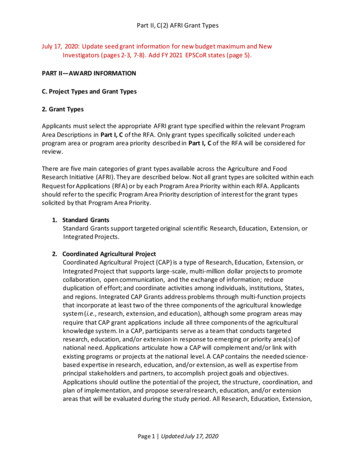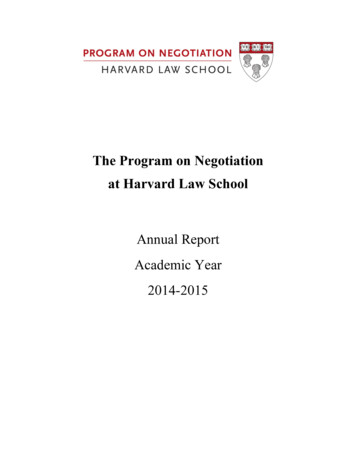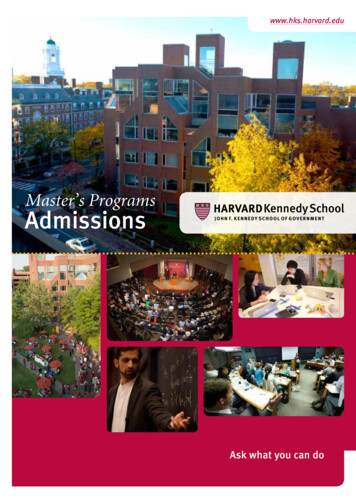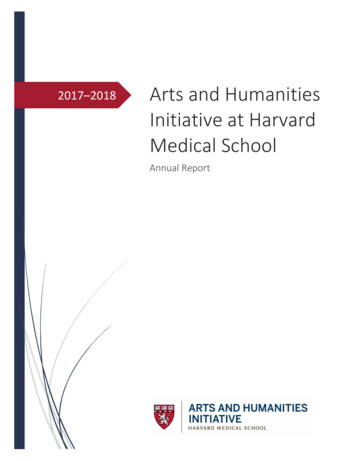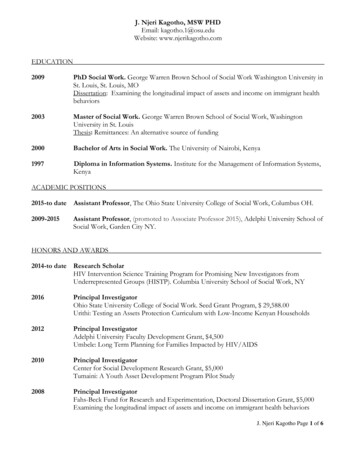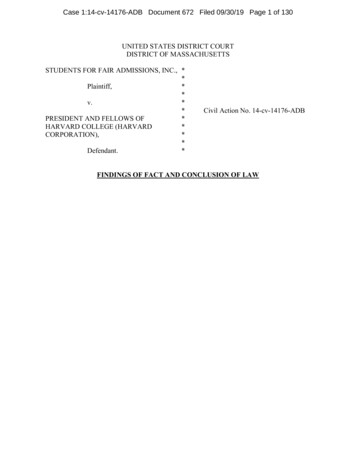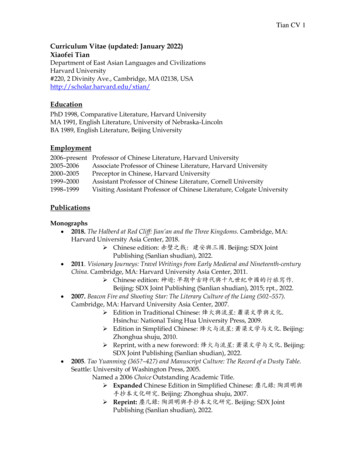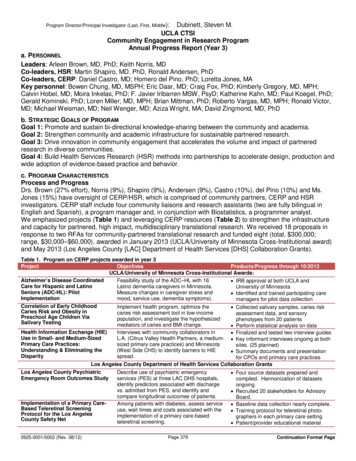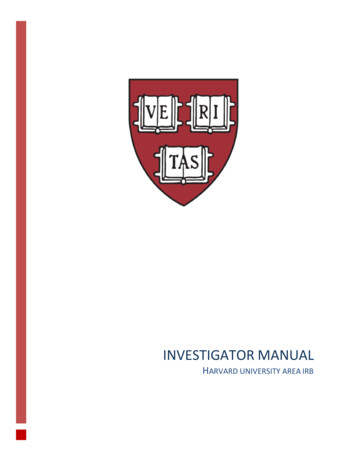
Transcription
INVESTIGATOR MANUALHARVARD UNIVERSITY AREA IRB
Table of ContentsPurpose . 5Key Definitions and Terms . 5ESTR . 5IRB . 5HIPAA . 5Human Research . 5Human Research Protection Program. 5Worksheets/Checklists/Template/Forms . 6IRB Determinations and Modes of Review . 7Not Human Subjects Research Determination . 7Not Engaged. 7Exemption Determination . 7Expedited Review Procedure . 8Convened IRB Review (“Full Board”) . 8Scope and Applicability of the Federal Regulations Governing Human Subjects Research . 9Determining when an IRB Application is Required . 9IRB Review Process . 9IRB Approval Criteria . 9IRB Decisions . 10Approval. 10Modifications Required to Secure Approval . 10Deferral . 10Disapproval . 10Principal Investigator Eligibility . 11Principal Investigator Responsibilities . 12Human Research Training . 13Reporting Financial Interests to the IRB . 14Conducting Research with Non-Harvard Collaborators . 15Accepting Review Responsibilities for another Institution . 15Ceding Review to other Institutions . 15Requesting Cede Review/Submitting External IRB in ESTR . 16Obligations as the overall study PI for an sIRB study . 16Obligations as investigator when relying on an external IRB . 17ESTR Record Access . 18Principal Investigator . 18Primary Contact . 18PI Proxy . 18Study Team Members and Others . 18HUA Investigator Manual (HRP-103) – version 3.0 / 01/15/2021Page 2 of 73
Submitting an Application in ESTR . 19Proposing Modification(s). 19Requesting Continuing Review . 19Requesting Study Closure . 20Ancillary Review . 20Preparing the Research Protocol. 21Consent Considerations . 29Additional Consent Form Language Requirements Relating to Conflict of Interest . 35Disclosing funding source . 35Disclosing the nature of any financial or proprietary interests . 35Explain why disclosures are being made and where participants can receive additional information . 36Special Considerations . 37Clinical and Medical Services During Clinical Research . 37Data Security . 37International Studies . 37Research in Schools . 38 The Family Educational Rights and Privacy Act (FERPA) (34 CFR Part 99) . 38 The Protection of Pupil Rights Amendment (PPRA) (34 CFR Part 98) . 38Secondary Data Analysis Projects . 39Deception and Incomplete Disclosure Studies . 39Debriefing . 39Use of Subject Pools . 40 Psychology Study Pool . 40 Harvard Business School Computer Lab for Experimental Research . 40Investigator Self-Experimentation . 40Additional Resources for Data Management . 42Record Retention . 42Prompt Reporting Requirements . 43Additional Requirements for Studies Sponsored by a Common Rule Agency (45 CFR 46.116(h)) . 44Additional Requirements: DHHS-Regulated Research1 . 45When a study subject withdraws from a study . 45Additional Requirements: for FDA-Regulated Research . 46When a study subject withdraws from a study:2 . 46For FDA-regulated research involving investigational drugs: . 46For FDA-regulated research involving investigational devices: . 48Additional Requirements: Clinical Trials (ICH-GCP) . 51Additional Requirements: Department of Defense (DOD) Research . 57Additional Requirements: Department of Energy (DOE) Research . 58Additional Requirements: Department of Justice (DOJ) Research . 60HUA Investigator Manual (HRP-103) – version 3.0 / 01/15/2021Page 3 of 73
Additional Requirements for DOJ Research conducted in the Federal Bureau of Prisons . 60Additional Requirements for DOJ Research Funded by the National Institute of Justice . 62Additional Requirements: Department of Education (ED) Research . 63Additional Requirements: Environmental Protection Agency (EPA) Research. 64Additional Requirements: General Data Protection Requirements (GDPR) . 65Additional Requirements: NIH Funded Research, including Certificates of Confidentiality . 66Protections and Requirements . 68Additional Protections . 68NIH CoC Policy Determination . 68Application Procedures for non-NIH Research . 68IRB Review . 69Health Insurance Portability and Accountability Act (HIPAA) Privacy Rule. 70Massachusetts Law . 73Principal Investigator Responsibilities and ESTR Assurance Statement . 76Provostial Review Process . 691)Risk to the researcher . 692)Reputational risks . 703)Risk to populations involved . 704)Aligned with the mission of the University . 705)Is it research? . 71Useful Resources . 72HUA Investigator Manual (HRP-103) – version 3.0 / 01/15/2021Page 4 of 73
PurposeThis Investigator Manual is designed to guide investigators and study staff through policies and proceduresrelated to the conduct of Human Research that are specific to the Harvard University Area (HUA) IRB office.Additionally, the manual serves as a guide for the HUA research community when preparing and submittingmaterials to the HUA IRB.General information regarding Human Research protections as well as relevant federal regulations andguidance has been incorporated throughout this manual where applicable.Key Definitions and TermsESTRElectronic Submission, Tracking & Reporting (ESTR) is the IRB’s online e-submission system, available atirb.harvard.edu. Users must have an active HUID/HarvardKey to access ESTR. ESTR-specific reference materialsand tutorials, including job aids and how-to instructions with screen captures, can be found on the ESTR SupportWebsite. A Study Submission Guide is available to guide investigators and study staff through the submissionprocess.To report technical problems with ESTR, contact the ESTR Help Desk at ESTRhelp@harvard.edu.IRBThe Institutional Review Board (IRB) is a committee that is required by federal law to protect the rights andwelfare of human subjects participating in research activities. The committee meets this mandate by reviewingproposed and ongoing human research activities, ensuring they meet specific criteria for approval. The HUA IRBoffice provides administrative support to the HUA IRB. Historically, the HUA IRB has been known as theCommittee on the Use of Human Subjects, CUHS.HIPAAThe Health Insurance Portability and Accountability Act (HIPAA) Privacy Rule establishes national standards forthe protection of health information (called “protected health information” or PHI). It applies to organizationssuch health plans, health insurance companies, health care clearinghouses, and health care providers thatconduct health care transactions electronically.These organizations are called “covered entities.” At Harvard, the Harvard University Health Services andHarvard School of Dental Medicine are covered entities under the HIPAA Privacy Rule; other schools/unitswithin Harvard are not HIPAA covered entities. Because of this, Harvard is referred to as a “hybrid coveredentity”To learn more about how the Rule may impact your research, see the section in this manual on HIPAA and referto the NIH booklet Protecting Personal Health Information in Research: Understanding the HIPAA Privacy Rule.Human ResearchThe HUA IRB follows the regulatory definitions of “Human Subjects Research”. To determine whether proposedactivities constitute the DHHS or FDA definitions of Human Subjects Research, investigators can refer to“WORKSHEET: Human Research Determination (HRP-310)”. If requested, the IRB will review the proposedactivities and make a formal “Not Human Subjects Research” determination. See Submitting an Application inESTR for how to prepare this request.Human Research Protection ProgramThe Harvard University Area Human Research Protection Program (HRPP) is a comprehensive system to ensure theprotection of the rights and welfare of participants in Human Research. The Harvard University Area is comprisedof the Cambridge and Allston campuses and include the Faculty of Arts and Sciences, as well as the followingschools: John F. Kennedy School of Government, Harvard Graduate School of Education, Harvard Law School,HUA Investigator Manual (HRP-103) – version 3.0 / 01/15/2021Page 5 of 73
Harvard Divinity School, Harvard Graduate School of Design, Radcliffe Institute for Advanced Study, Harvard Schoolof Engineering and Applied Sciences, and the Harvard Business School.The HRPP is comprised of institutional leadership; Harvard University Area Administration, which includes theHUA IRB administrative support staff; Institutional Review Board (IRB); investigators and their study staff;Department Chairs, and other relevant offices. The document “HUMAN RESEARCH PROTECTION PROGRAM PLAN(HRP-101)” describes the HUA overall plan to protect participants in Human Research, including: The mission of the Human Research Protection Program.The ethical principles that each IRB follows governing the conduct of Human Research.The applicable laws that govern Human Research.When Harvard becomes “engaged in Human Research” and when someone is actingas an agent ofHarvard conducting Human Research.The types of Human Research that may not be conducted.The roles and responsibilities of individuals within Harvard.Worksheets/Checklists/Template/FormsAll Worksheets, Checklists, Templates, and Forms referenced within this document can be found in the ESTRLibrary.HUA Investigator Manual (HRP-103) – version 3.0 / 01/15/2021Page 6 of 73
IRB Determinations and Modes of ReviewNot Human Subjects Research DeterminationActivities must meet the definitions of “Human Subjects Research” to fall under the HHS Protection of HumanSubjects Regulations. Activities that do not meet these definitions are not subject to HUA IRB oversight. Refer to“WORKSHEET: Human Research Determination (HRP-310)” for guidance on whether the proposed activitiesconstitute Human Research. Contact the HUA IRB office in cases where it is unclear whether an activity is HumanResearch. If an investigator would like the IRB to make a formal “Not Human Subjects Research” determination,see Submitting an Application in ESTR.Not EngagedHarvard is engaged in Human Subjects Research when its faculty, students, employees or agents, as part of theirHarvard or Harvard-commissioned activities, are interacting or intervening with Human Subjects for the purpose ofconducting research or are obtaining individually identifiable private information for research purposes in aresearch study that involves more than one institution. Harvard University follows the Department of Health andHuman Services (DHHS) Office for Human Research Protections (OHRP) Guidance on Engagement of Institutions inHuman Subjects Research, which states “In general, an institution is considered engaged in a particular nonexempt human subjects research project when its employees or agents for the purposes of the research projectobtain: (1) data about the subjects of the research through intervention or interaction with them; (2) identifiableprivate information about the subjects of the research; or (3) the informed consent of human subjects for theresearch.” Should a Harvard agent not meet the above threshold for engaging the institution, the IRB will issue anot engaged determination.Exemption DeterminationCertain categories of Human Research may be exempt from regulation. Investigators may not determinewhether their proposed Human Research is exempt. Instead, formal determination is required by the HUA IRBoffice prior to implementation in the field. The IRB office uses “WORKSHEET: Exemption (HRP-312)” whendetermining whether a particular study meets one or more exempt criteria.Most exempt submissions do not require a modification if the exempt determination does not change. You alsodo not need to submit a modification when study team members change.When should an Exempt study submit a modification? Including children, prisoners, or other protected populations. Study procedures that fall outside the exempt category. For example, an intervention was initially goingto take place in one sitting, but the research team decides to include longitudinal effects, so theyimplement a follow-up treatment. Increase in risk. Ancillary policy / regulations: GDPR, collection of sensitive information requiring a Limited IRB review,change in data security assessment. Change in Principal Investigator. Change in Faculty Sponsor. If there is new funding.What about other changes? If an exempt study is changing the design of the study or major revision to the procedures, a newexempt determination request should be submitted.When conducting exempt human research internationally, the Principal Investigator is required to comply withapplicable local laws, legislation, regulations, and/or policies. Additionally, if local IRB/ethics review is required, itmust be obtained before any Human Research activities are conducted in the field. If assistance with applicableHUA Investigator Manual (HRP-103) – version 3.0 / 01/15/2021Page 7 of 73
local requirements is needed, contact the HUA IRB officeExpedited Review ProcedureCertain categories of non-exempt Human Research may qualify for review using the expedited procedure,meaning that the project may be approved by one or more designated reviewers, rather than by the convenedIRB. Refer to “WORKSHEET: Expedited Review (HRP-313)” for reference on applicable categories of research.Protocols eligible for review using the expedited procedure are reviewed on a rolling basis.Convened IRB Review (“Full Board”)Non-exempt Human Research that does not qualify for expedited review and/or is greater than minimal riskmust be reviewed by the convened IRB. The HUA IRB office supports the HUA IRB. The IRB meets monthly. Theconvened IRB meeting schedule and submission deadlines are available here: d-meeting-datesHUA Investigator Manual (HRP-103) – version 3.0 / 01/15/2021Page 8 of 73
Scope and Applicability of the Federal Regulations GoverningHuman Subjects ResearchThe Harvard University Area commits to apply its ethical standards to all Human Research regardless of funding.When Harvard University Area is engaged in DHHS Human Research that is conducted, funded, or otherwisesubject to regulations by a federal department or agency who is a signatory of the Common Rule, the HarvardUniversity Area commits to apply the regulations of that agency relevant to the protection of Human Subjects.When Harvard University Area is engaged in FDA Human Research, it commits to apply the FDA regulationsrelevant to the protection of Human Subjects.Determining when an IRB Application is RequiredHUA IRB is responsible for the review and oversight of Human Research conducted by its agents. Its oversightapplies regardless of whether the Human Research is conducted at a Harvard University Area school, anotherinstitution, in another country, and/or in collaboration with non- Harvard affiliates. For research with nonHarvard collaborators, see Conducting Research with Non-Harvard Collaborators for additional considerations.Some activities do not require HUA IRB review. Activities that do not meet the definition of “Human Research”do not fall under the HHS Protection of Human Subjects Regulations. Activities that do not meet this definitionare not subject to HUA IRB oversight. Refer to “WORKSHEET: Human Research Determination (HRP-310)” forguidance on whether the proposed activities constitute Human Research. Contact the HUA IRB office in caseswhere it is unclear whether an activity is Human Research. If you would like the IRB to make a formal “NotHuman Subjects Research” determination, see Submitting an Application in ESTR.IRB Review ProcessOnce an application is submitted in ESTR, it will be reviewed by an IRB staff person. After initial review, the IRBstaff may request clarifications, revisions, and/or additional information in ESTR (“Clarifications Requested”). ThePrincipal Investigator may “Submit Response” in ESTR to resolve these requests. When resolved, the IRB staff willeither complete their review and issue a determination letter or assign the application to an IRB meeting forreview. The convened IRB may request additional information following its review.A determination letter will be issued in ESTR once the review is complete. System notifications are sent from ESTRthroughout the review process to inform Principal Investigators when additional action is necessary. To check onthe status of a submission, log in to ESTR at irb.harvard.edu. For questions or concerns, contact the HUA IRB officeor use the comment feature in your study submission space in ESTR.IRB Approval CriteriaThe criteria for IRB approval of non-exempt Human Research can be found in “WORKSHEET: Criteria forApproval (HRP-314)”. Additional checklists may be applicable depending on the nature of the proposed HumanResearch, e.g., inclusion of children will prompt the use of “CHECKLIST: Children (HRP-416)”.Worksheets and Checklists are used by IRB members and reviewers at the time of initial review, continuing review,during the review of modifications to previously approved Human Research, and when reviewing Reportable NewInformation. Investigators are also encouraged to use these materials as a reference or guide when writing theResearch Protocol in a way that addresses the criteria for approval. Worksheets and Checklists can be found in theESTR Library (HarvardKey log in required for access).HUA Investigator Manual (HRP-103) – version 3.0 / 01/15/2021Page 9 of 73
IRB DecisionsThe IRB has the authority to approve Human Research, require modifications to secure approval, ordefer/disapprove Human Research. When the IRB cannot approve the research at a convened meeting forreasons unrelated to the research, such as loss of quorum, the review will be tabled. Under those circumstances,the research will be reviewed at the next meeting.ApprovalIf the IRB has approved the Human Research, it may commence once all applicable organizational and/or localapprovals have been secured. IRB approval is granted for a limited period of time, not exceeding one year,which is noted in the approval notification letter.Modifications Required to Secure ApprovalIf the IRB requires modification(s) to secure approval, the notification letter will outline specific revisions to theHuman Research and/or study materials, e.g., Research Protocol, consent form, study tools, etc. HumanResearch may not commence until the IRB grants final approval.If the Principal Investigator accepts the required modifications, s/he should submit the revised materials viaESTR to the IRB within 45 calendar days. If all requested modifications are made, the IRB will issue a finalapproval notification letter after which time the Human Research can begin.If the Principal Investigator does not accept the modifications, s/he should write a response detailing why suchmodifications are not appropr
schools: John F. Kennedy School of Government, Harvard Graduate School of Education, Harvard Law School, HUA Inve
